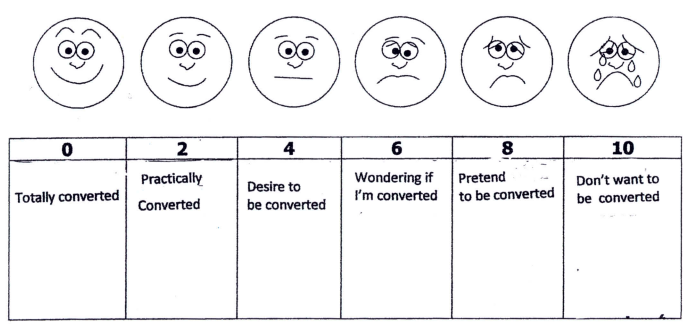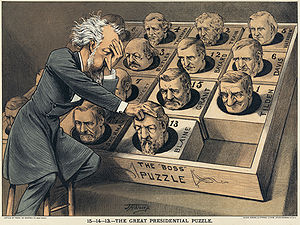Author: Dane Laverty
-

Standing Firmly on Dubious Truths
I recently watched The Crucible, a movie about the Salem witch trials. The core issue of the story is, how do you track down the criminal in an untraceable crime? The people of Salem believed that witchcraft could be performed by anyone, anywhere, with no outwardly visible evidence. Convinced of the reality of witchcraft, and…
-

Created Truth vs. Discovered Truth
Can truth be created? In the church, we tend to privilege truth that is discovered, and we dismiss creative doctrine-making attempts as the “philosophies of men”. Our common discourse places the identification of truth as solely within the purview of God’s authority, to be dispensed only through His designated prophet. In this paradigm, discovered truth…
-
The First Freak-Out Question
My five-year-old daughter Alanna started kindergarten a few weeks ago. She’s loving it, and I love getting to talk with her about her day when I get home from work. She shares experiences, sings songs that she learned, shows me her artwork, and tells me about her friends. And she’s started asking questions. That’s great…
-

Measuring Testimony
Perhaps you’re familiar with the Wong-Baker pain chart, used by nurses for assessing pain. It looks like this:
-
Feminism and Religion
– – – I saw this photo on Reuters. What struck me most was the head scarf she is wearing. Here is a woman who, by joining the fight against the Taliban, is not rejecting her heritage. She is actively pursuing a new world, but not at the expense of her faith. The war in…
-
The Icarians
While browsing the Wikipedia entry on Nauvoo, I saw this: Nauvoo attracts large numbers of visitors for its historic importance and its religious significance to members of…groups such as the Icarians. I’d never heard of the Icarians before. So, continuing down the Wikipedia path, I found this: The Icarians were a French utopian movement, founded…
-
Those Oh-So-Temporary Golden Ages
I started teaching seminary three weeks ago. We’re off to a great start. I don’t have any goofballs in my class, so that helps. As I started preparing before the semester began, I tried to figure out how to present the Doctrine and Covenants in a way that could be compelling to high school students.…
-

Instruction as Worship
It’s no secret that we Mormons aren’t big on praise worship in our meetings. You won’t hear any “hallelujahs” or “amens” in our sacrament meetings. And that’s fine for us. I think that members of our church tend to believe that worship is best accomplished through living in accordance to God’s commandments — that obedience…
-
Antichrist to an Antichrist
I’m currently through the beginning of Nietzsche’s The Will to Power. I like what I’ve read, and I’ve identified a few possible Nietzschean approaches to Mormonism. Joseph and Neitzsche as two men whose respective philosophies are fundamentally similar. Latter-Day-Saintism as Nietzsche’s “Revaluation of All Values”. Joseph as a realization of Neitzsche’s ubermensch. Now I’m no…
-

The “V” Words
This post is brought to you by the letter “V”. (Don’t worry, that’s grape juice in the picture. Really. I’m sure it is.) Vigor. Verdant. Vibrant. Vivacious. AliVe. These are the qualities I expect true religion to inculcate. Does it make me think more? Does it make me love more? Does it make me see…
-

Labels
Alright people, here we go…on labels! (apollo, this one’s for you.) Labels of preference These are the labels anyone can just pick for themselves. “Awesome”, “feminist”, and “Abba fan” are all labels of preference. You just pick one, apply it to yourself, and no one can say you’re wrong! These labels aren’t owned by any…
-

Scriptural Literacy
I’ve just been called as a seminary teacher. Today I was sustained during sacrament meeting. I’m really excited about it — I enjoy working with youth, I enjoy the scriptures, and I enjoy teaching. Heck, I’m even a morning person. The course of study is the Doctrine & Covenants. It has me thinking about how…
-

Wanted: Greener Grass
People leave the church because…well, I don’t know. I’ve had a few acquaintances who’ve decided to be done with it, but I’ve never sat down and talked with them about why. If I were to guess, it’s because they discovered things they didn’t like about the church and decided to head out to where things…
-

Excuses for Stopping
The post is brought to you by my wife, Heather. Please be nice to her :) ****** It was time for Dane and I to have a discussion — the, “our baby is approaching 15 months old, do we want to have another one?” discussion. We currently have three wonderful, healthy children. At one point…
-

The One True Hot Dog Stand
I’m hungry. I need a hot dog. Nate’s Dawgs smells delicious, but they’re a little pricey. Joe’s Rolled Meats are cheap, but they taste like cigars. Trader Moe’s dogs are additive free, so I guess they’re healthier than the others. But the girl at the Delirama counter is a total babe. How can I possibly…
-

God’s Game
It seems to me that there are two contradictory sets of underlying assumptions about the plan of salvation. One is the “salvation as a game” perspective and the other is “salvation as a journey” perspective. The key difference between a game and a journey is that in a game the rewards are given by people,…
-

Late-night Doctrinal Discussions
I’m in the final semester of an MBA program at Oregon’s Willamette University. I took a job in California a couple months ago. That means I’ve got a killer commute to class. All that to say that my time for deep, theosophical discourse with my wife is limited to the occasional late-night discussion when we…
-

Life’s Tough When You’re a Girl (or a Boy)
A girl I know was considering taking a commissioned sales job at a truck stop. She commented to me, “Maybe I’ll wear a tight shirt and a push-up bra. I bet that would help with my sales numbers.” My immediate reaction was, “Don’t sell yourself like that!” I’m told that there is a correlation between…
-

Reasoning the Doctrines
The question of the truth of the church didn’t enter my consciousness until I was about twelve years old. That was the age when I started discussing religion with my school friends. I remember a conversation I had with a friend after school. His family was not religious, and he was curious about my beliefs.…
-

“And What Do The Women Do?”
I credit any awareness I have of gender issues in the church to the challenging, patient, and frank discussions that take place within the bloggernacle. Reading the first-hand experiences shared by many sincere sisters here has forced me to reconsider the paradigm I was comfortable in — the one where men and women have separate…
-
Calling Silos
Julie’s post on scouts has me thinking about how we do callings in the church. Several people pointed out that since scout leaders are called rather than volunteering, you end up with people who aren’t enthusiastic or engaged in the program. I understand that you can’t just let everyone pick their own callings in church,…
-

Nexus of Harmony
I’m a believer in having role models (and anti-role models). One of the great things about sharing the world with billions of other people is that you get insights into where you might end up depending on the paths you take. I like to watch people who are twenty or thirty years older than I…
-

Noel’s Memorial Service
The memorial service was held in the mouth of the Russian River. Not on the beach by the river, but right in the water. Over a hundred surfers gathered there, clad in their wetsuits. They paddled on their surfboards into the river, pulling a massive floral wreath out on the water with them. The first…
-

Various Thoughts
Photo of Noel Robinson by Todd Glaser My cousin died this week. He was a surfer, Noel Robinson. All the surfing sites have pieces on him (this one is my favorite — what a great picture!), and there’s been a huge response from the surfing community. Noel and I got along well, but we only…
-

Personality Tests and “Muchness”
A friend of mine came to visit a couple weeks ago, and he had me take the “Color Code” personality test. Perhaps you’re familiar with it. It divides people into red (control-oriented), blue (intimacy-oriented), yellow (socially-oriented), and white (peace-oriented) personalities. There are plenty of tests like this — Myers-Briggs, enneagrams, etc. — that result in…
-
Taking Happiness at Face Value
“…wickedness never was happiness.” — Alma 41:10 I’ve only ever heard this phrase from the scriptures used as an encouragement toward righteousness — “if you are wicked, then you won’t be happy, so be righteous!” But reducing the scripture to a causal relationship like “if ( wicked ) then { not happy }” necessarily implies…
-
Luke’s Spiritual Journey
I’ve asked several of my friends from different religious backgrounds to share the stories of their spiritual paths through life — what they believe, and why. This is the response of my friend Luke. Despite having looked into many religious movements as part of my graduate studies, I find writing about my own spiritual journey…
-
Introducing, Me
We T&S bloggers are pretty impersonal. Our posts tell about the kinds of things we think about, but we don’t share much about who we are or what we do. So here’s a bit about me.
-
Approaching Diversity
The text for today’s blog post is brought to you by BYU Speeches, specifically, “Weightier Matters“, by Dallin H. Oaks (does anyone here know if speeches are quoted, underlined, or italicized?). In part of his talk, Elder Oaks discusses diversity in terms of means vs. ends. Specifically, he says, “Since diversity is a condition, a…
-

A Monastery for Families
My wife and her friends chat together in the quad while the kids play outside. This last week, one of her friends said, “Wouldn’t it be wonderful if we could all just buy some land and move out there together?” This kind of sentiment is what I’m all about. We just need some place, some…
